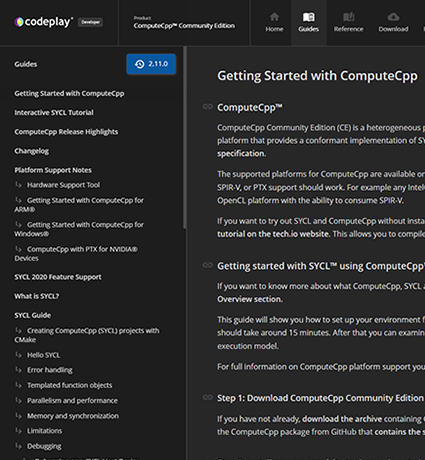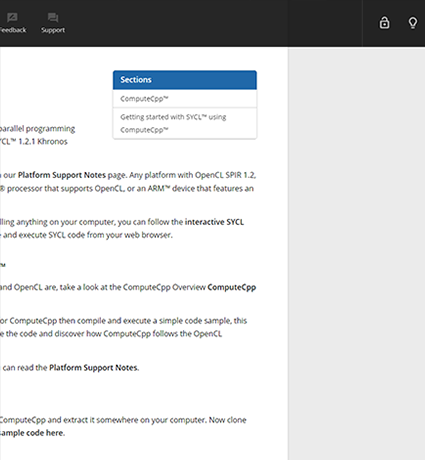Platform Dependencies
Each supported platform has a set of dependencies which are required in order to build the oneAPI Construction Kit.
Once the platform dependencies have been installed please read the Developer Guide for more information about building and contributing to the oneAPI Construction Kit.
Ubuntu 20.04
On an x86-64 host system these are the minimum requirements to build the oneAPI Construction Kit. These packages are required for any build configuration.
$ sudo apt update
$ sudo apt install -y build-essential git cmake libtinfo-dev python3
Recommended for Ubuntu 20.04
Ninja is a useful, fast, build tool. To use it pass
-GNinjato CMake the first time it configures a build directory.clang-format 16 is a tool to format C/C++/Java/JavaScript/Objective-C/Protobuf code. All oneAPI Construction Kit source files are required to be formatted before being committed to the repository, including source files which are generated by the build.
lit is a portable tool for executing LLVM and Clang style test suites.
$ sudo apt update
$ sudo apt install -y ninja-build doxygen python3-pip
$ sudo pip3 install lit virtualenv cmakelint clang-format==16.0.6
Tip
For ease of use python3 and pip3 can be symlinked to python and
pip with the following commands:
$ sudo apt install python-is-python3
$ sudo update-alternatives --install /usr/bin/pip pip `which pip3` 30
32-bit Compile
Install the 32-bit C and C++ standard libraries, LLVM also depends on the 32-bit terminal info library.
$ sudo apt install -y gcc-9-multilib g++-9-multilib libc6-dev:i386 lib32tinfo-dev
Warning
The gcc-multilib and g++-multilib packages conflict with the Arm and
AArch64 toolchain packages below. To install the 32 bit libraries at the same
time use gcc-9-multilib, g++-9-multilib, and libc6-dev:i386 that
gcc-multilib and g++-multilib depend on but do not conflict with the
Arm and AArch64 toolchain packages.
Arm 32-bit Cross Compile
In addition to the 32-bit packages, install the Arm toolchain.
$ sudo apt install -y gcc-9-arm-linux-gnueabihf g++-9-arm-linux-gnueabihf
Arm 64-bit (AArch64) Cross Compile
Install the AArch64 toolchain.
$ sudo apt install -y gcc-9-aarch64-linux-gnu g++-9-aarch64-linux-gnu
Ubuntu 22.04
Support for Ubuntu 22.04 is still experimental.
Windows 10
On an x86-64 Windows 10 host system these are the minimum requirements to build the oneAPI Construction Kit. These tools are required for any build configuration.
Visual Studio 2017 or 2019
CMake 3.4.3+
Python 3.6.9+
Vulkan SDK 1.1.97+
Windows 10 does not provide an adequate package manager. However, the third-party Chocolatey package manager can be used to install the required packages.
$ choco install -y python
$ choco install -y cmake --installargs 'ADD_CMAKE_TO_PATH=System'
There are a number of choices for installing Git on Windows, the recommended
approach is to install Cmder which bundles Git, various UNIX core utilities,
and an improved cmd.exe user experience.
$ choco install -y cmder
Alternatively, to install Git for Windows and forego using Cmder do the following.
$ choco install -y git
Recommended for Windows 10
Ninja is a useful, fast, build tool, to use it pass
-GNinjato CMake the first time it configures a build directory.clang-format 16 is a tool to format C/C++/Java/JavaScript/Objective-C/Protobuf code, all oneAPI Construction Kit source files are required to be formatted before being committed to the repository, including source files which are generated by the build.
lit is a portable tool for executing LLVM and Clang style test suites.
$ choco install -y ninja doxygen.install
$ choco install -y llvm --version 16.0.6
$ pip install lit virtualenv cmakelint
Vulkan SDK
For Vulkan support the Vulkan SDK is required to be installed. It can be acquired from LunarG. The latest version should always be supported. The minimum supported version is 1.1.97.
The Vulkan SDK includes SPIRV-Tools as part of the package. Therefore SPIRV-Tools does not need to be installed separately.
Package Manager Installation
Users of Ubuntu 20.04 and later should configure their apt package manager to
install the Vulkan SDK packages directly as described by the LunarG Vulkan SDK
packages page. This installation method does neither set nor require the
VULKAN_SDK environment variable, avoiding the configuration
complexities experienced when installing manually.
Windows 10 users can install the Vulkan SDK Chocolatey package:
$ choco install -y vulkan-sdk
Manual Installation
Other Linux users will need to take some extra steps after downloading the
tarball distribution. First run the build_tools.sh script; then source the
setup-env.sh script whilst the Vulkan SDK directory as the current
directory. These steps are needed to access the spirv-as tool through the
VULKAN_SDK environment variable in order to successfully compile
the oneAPI Construction Kit and generate all test suites correctly.
Hint
Modifying .bashrc to source the setup-env.sh script avoids having to
remember to do this on every new terminal session building the oneAPI
Construction Kit.
The setup-env.sh script prepends VULKAN_SDK to the system
PATH, leading to prioritization of VULKAN_SDK binaries
ahead of any other versions of the tools which may be installed in /usr/bin.
SPIRV-Tools
When OpenCL support is required but Vulkan support is not, SPIRV-Tools
may optionally be installed on the system PATH. This is
recommended to achieve good coverage of SPIR-V compilation paths.
Follow the build instructions, or install the pre-built binaries in the repository. It’s harder to pin down versions of SPIRV-Tools since they don’t do releases, but we should support any commit from after January 2019.
Ubuntu 20.04 users can install spirv-tools from the package repository:
$ sudo apt install -y spirv-tools
Warning
As the LunarG Vulkan SDK packages and the spirv-tools package both
provide SPIRV-Tools builds, it is possible these packages may conflict
causing issues during installation. Choose one or the other.


